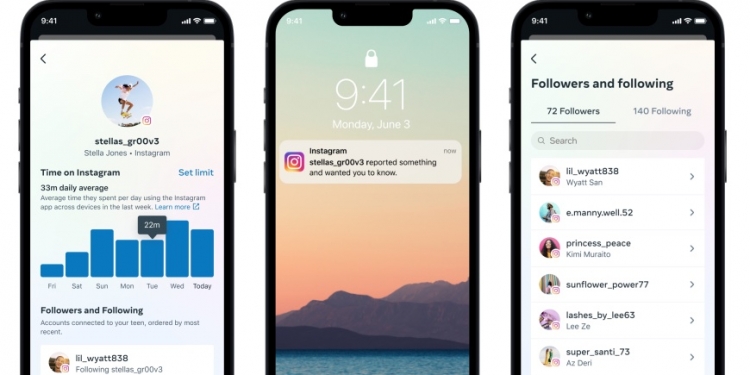Meta announced that Instagram’s Family Center, as well as its Parental Supervision tools, will start launching in Malaysia from 16 September onwards. While it looks like the tools seem to be a step in the right direction, we still had some concerns. For one thing, it doesn’t look like teens would want to let their parents supervise their accounts, and they would probably work around the features.
What are the Parental Supervision tools?
The new Supervision features will allow parents and guardians to supervise the activities of the teens (ages 13 to 18) using the social media platform. They won’t exactly be shown every activity that their teen does, but Phillip Chua, Head of Instagram Public Policy for APAC, said that the parents will be shown “enough”. The Supervision features include:
- An overview of new connections their teens make on Instagram, like who they followed and who has followed them
- Daily time limits and scheduled breaks during the week to help teens balance their time on Instagram
- Teens can notify you through the app if they make a report on Instagram so that you can discuss it further
Judging by the list of features stated by Meta above, it doesn’t look like parents or guardians will have access to what exactly their teens have typed or consumed on the app—so there’s still a tiny bit of privacy that they will have. However, teens will need to approve parental supervision if their parent or guardian requests it. Basically, they can deny the request if they want to. Teens will also be able to initiate supervision.
“(The) updates are in addition to the improvement we’ve made over the last year, including helping teens have safer and more private experiences, restricting how advertisers can reach young people, understanding users’ real age, and providing teens with more tools to better manage their Instagram experience. Over time, we hope the Family Center will allow parents and guardians to help their teens manage experiences across Meta technologies…” said Chua.
Will teens even allow parents to supervise them?
Here’s the thing, even though the Parental Supervision tool might be a great idea and would help let parents manage their teens’ online activities, it might not be used very well. Parents will need to have their teens’ permission to supervise their accounts, and their teens can simply deny their request.
There’s also a concern about how users are able to make multiple accounts, and there might be accounts that parents don’t know about. Not to sound like a boomer—but there are apparently things called “finstas” which are basically private accounts reserved for the account’s followers and close friends.
But if you hope that you could use Parental Controls in secret without your teens knowing, it might be extremely difficult. Daphne Iking and Aaron Aziz, who made appearances at the briefing today, brought up if they could do that with their own kids’ accounts. However, Chua said that the kids would get notifications on their ends too. So, the kids will know about them being surpervised—and they could also take away the ability from the parents as well.

Parents will also need to have their own Instagram accounts in order to supervise their kids’ activities. There’s a concern that parents who don’t have access to social media or don’t really know how social media works won’t be able to supervise their kids as well.
And if the major concern is sexual predators, is Instagram doing something about banning these users with weird histories? Reporting sexual predators on Instagram is pretty difficult, as you need to also file either a link to a listing in a national sex offender registry, a link to an online news article, or a link to a court document so that Facebook would disable their account.
Chua, however, stated that as long as you’re potentially suspicious of an adult, Instagram is able to prevent them from contacting you. Meta continued saying that they are taking suspicious pages down, but there are many, many accounts. They hope that with the Parent Supervision tools, parents can have enough to be able to talk to their teens about their online activities.
Meta says that everyone needs to be at least 13 years old to create an Instagram account—which is why their tools for targeted to just teens. But I personally think that banning kids completely would just mean that kids would be able to find more creative loopholes around it, seeing as kids do have Instagram accounts anyway.
Meta’s Parent Supervision tools aren’t perfect. However, Chua stated that they aim to “start in the middle” and work their way as they go. Hopefully, they could refine the way they deal with potential predators as well.








